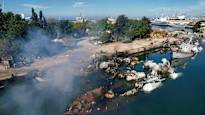According to estimates, it was destroyed in a couple of days with strikes by planes, warships and drones up to 80 percent Equipment of the Syrian Armed Forces.
The Israeli Air Force launched the attack by striking Syrian anti-aircraft positions. After this, Israel says it has systematically destroyed, for example, military airports, fighter planes, helicopters, airframes, radars, weapon depots, cruise, anti-ship and ballistic missiles and tank storage depots.
The Israeli navy completely destroyed the Syrian navy. It consisted of 15 ships in the ports of Latakia and al-Bayda, the most significant of which were Soviet-made missile boats, says for example Naval news publication.
Attacks were also targeted at weapons factories, the armed forces’ scientific research institute and to chemical weapons stockpiles. The Israeli army has also destroyed the firing positions prepared by the Syrian army near the border between the two countries.
A unique blow in military history
Department head of the Defense Forces Research Institute, lieutenant colonel Juha Mäkelä considers the Israeli operation exceptional.
He can’t remember another instance of another country’s armed forces being wiped out almost to nothing so quickly.
– I personally can’t find any similar military history event from the Second World War, he says.
The most similar cases are Israel’s 1967 so-called Six-Day War and the 1973 Yom Kippur War.
In the Six Day War, Israel received a tip-off that the Arab countries were planning to attack Israel, so Israel made a pre-emptive strike and destroyed the Egyptian air force in the fields. In the Yom Kippur War, Arab countries attacked, but Israel managed to strike back.
According to Mäkelä, Israel’s strategy is based on prevention. It tries to keep warfare outside the borders of the country because the country is very small.
A devastating attack, but not complicated
However, according to Mäkelä, Israel’s attack was not a show of military mastery, because there was no resistance at all.
– The Syrian armed forces had abandoned all their equipment. […] There have been attacks on targets that were not capable of defense and that the state did not even intend to defend, he says.
– Some of this equipment has landed unprotected at airports and naval bases, anti-aircraft was not activated, so it has been there to be destroyed by force, he continues.
For years, Israel had been waiting for the moment when Bashar al-Assad the Syrian regime led by is weak, says the Israeli Israel Hayom magazine.
Israel’s political and military leadership were unusually unanimous that the opportunity had to be seized as soon as the rebels had captured Damascus.
A lot of intelligence had been gathered, so the targets were known.
Mäkelä also reminds that the way the Syrian armed forces operate made its equipment easy targets.
– They don’t have a tactic like Western countries and for example Finland, that in the event of a crisis, the equipment is dispersed away from the bases, but once it has been known where the peacetime bases are located, it has been very easy to attack them.
It should also be noted that even if the Syrians had tried to resist, their weaponry was completely outdated compared to Israel’s state-of-the-art equipment.
How did the Middle East change?
Mäkelä estimates that it will take decades for Syria to rebuild its armed forces.
In terms of the balance of power in the Middle East, the events of the past few months have been revolutionary, he states. Earlier in the fall, Israel destroyed the Lebanese Hezbollah organization, now the Syrian regime, which was part of its enemies, has fallen and the weapons have been destroyed.
For Israel, the most important thing is that Iran is no longer able to deliver weapons to Lebanon through Syria. Iranian advisers and soldiers have been forced to leave Syria.
Warfare is not over in the Middle East
In the short term, Israel has won a big game, but Mäkelä is not at all sure if it is a victory in the longer term.
Al-Assad’s regime was a known enemy to Israel. The new rulers of Syria can turn into an enemy for Israel whose methods of operation are unknown, he describes.
The Islamist HTS organization that took power in Syria will certainly not forget Israel’s bombing campaign, he predicts.
In Israel, there may be a desire to hit Iran even more, thinks Mäkelä. According to him, it depends on the new president of the United States About Donald Trumpwhether Israel will be allowed to expand the conflict.
Mäkelä fears that the destruction of Syria’s weapons stockpiles will not end the fighting in the Middle East.
– Although the threat has now temporarily disappeared, the Middle East region has been a typical example of the fact that borders are leaking and that weapons systems can be brought, if necessary, to places where they can be used.
What does the court say?
Israel’s actions have sparked debate over whether the attack was justified.
For example, in a right-wing newspaper published in the United States in the New York Post in a published opinion piece, Israel is said to have done the world a favor by destroying Syria’s chemical weapons caches before the weapons could have ended up in the hands of potential terrorists.
This was it The basis of Israel for the destruction of both chemical and other Syrian weapons.
From the point of view of international law, the argument is not valid.
UN Special Rapporteur on Human Rights Ben Saul condemns Israeli strikes.
– International law does not under any circumstances justify preventive destruction of another country’s weapons. This is completely illegal, he writes.
They come to the same conclusion of the European Journal of International Law cognoscenti.
According to them, Israel’s pre-emptive strike would only be defensible if an immediate attack threat from Syria had been visible. According to them, it wasn’t.
